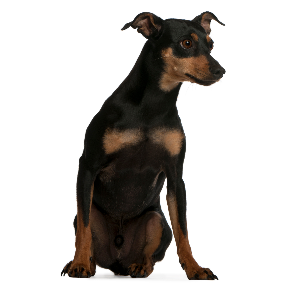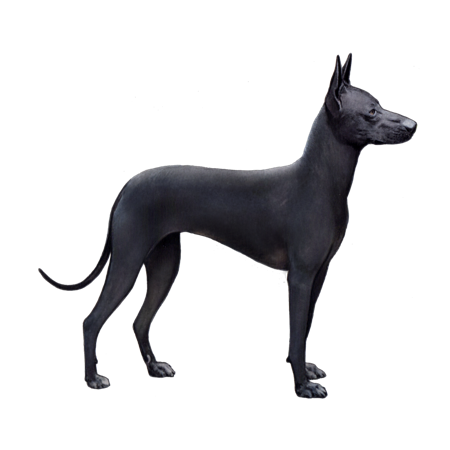
German Pinscher
The German Pinscher is intelligent, curious, and energetic (to say the least). Dogs of this breed are happiest running free in the yard. They have playful personalities and absolutely love toys.
Interested in discovering if your dog is a German Pinscher?
Check out Wisdom Panel's DNA tests.

German Pinscher Traits
General Appearance
A substantial dog, the German Pinscher has a square build that is smooth, polished, and sleek.
Coat and Colouring
The German Pinscher's coat may be completely reddish-brown or black with a reddish-brown muzzle, chest, and legs.
Distinctive Physical Traits
German Pinschers move in a laid-back way that displays confidence. The breed's long, wedge-shaped head contains a pair of attentive and alert eyes. These medium-sized dogs are perfect for a household with a fenced yard where they can run at their leisure.
German Pinscher Temperament
A busy breed, the high-spirited German Pinscher might not be the best dog for every household. Though very affectionate and loving with family, the German Pinscher can be reactive toward perceived threats. On the other hand, this vigilance makes the breed well-suited for guarding.
But for these reasons, German Pinschers may not be very good with young children, and adult supervision is imperative for any interaction. German Pinschers also tend to bark at other dogs and do not always get along with other pets.


German Pinscher History
As one of Germany's oldest breeds, German Pinschers originally served as multi-purpose farm dogs—hunting, controlling vermin, and guarding the home. German Pinschers are exceptionally skilled ratters. Their ability to clear stables and kitchens of pests made them indispensable to German farmers.
The Doberman Pinscher, Miniature Pinscher, and Schnauzer all owe their existence to this intelligent and spirited dog—which experts believe is their common ancestor.
German Pinscher Care
Nutrition
German Pinschers require a high-quality dog food that is age-appropriate—whether it's commercially manufactured or homemade (with a veterinarian's supervision and approval).
It's important to monitor the amount of food you give your German Pinscher. Reduce the portions or restrict calories if your pup gains weight. Also, remember that giving too many treats in addition to regular meals can contribute to obesity.
Grooming
The German Pinscher's short, dense coat needs minimal grooming. Weekly brushing and an occasional bath will keep your dog looking great.
You should trim your German Pinscher's nails monthly. If they become overgrown, your dog may experience pain or problems walking and running. Also, be sure to check your German Pinscher's ears weekly and clean as necessary.
Exercise
German Pinschers are athletic, nimble, and very energetic. As such, they need plenty of daily exercise for physical and mental health.
With a strong prey drive and high intelligence, German Pinschers are exceptional in competitions. They will take on almost any challenge with gusto—including canine sports such as obedience, agility, rally, and tracking.
Training
The German Pinscher has a stubborn streak. But you can overcome it with reward-based training methods. (So, get the treats and toys ready!)
Labeled a "thinking breed," German Pinschers sometimes become bored with monotonous obedience training and disobey commands. The solution is to mix up your approach and incorporate various activities.

German Pinscher Genetic Health Conditions
-
Glycogen Storage Disease Type Ia (Discovered in the German Pinscher)
Glycogen Storage Disease Type Ia (GSD Ia) is a severe metabolic disorder causing critically low blood sugar levels and liver enlargement. The associated genetic variant has been identified in the German Pinscher.
-
von Willebrand's Disease, type 1
von Willebrand's Disease (vWD) Type 1 is a blood clotting disorder that typically causes mild bleeding tendencies although some affected dogs may have more severe signs. It is the result of low levels of von Willebrand's factor, a blood protein that helps stabilize blood clots.
Knowing if your German Pinscher is a carrier or at-risk for these conditions can help you and your veterinarian plan for your pup's lifelong care. With Wisdom Panel™ Premium, you can get results for over 200 genetic health tests.
Breed Group
Terrier
The Terrier Group ancestors were bred to hunt and kill vermin. They are often characterized as feisty and energetic dogs whose sizes range from fairly small to much larger.
Resources
https://www.akc.org/dog-breeds/german-pinscher/
https://www.google.com/books/edition/German_Pinscher/Zs8KBgAAQBAJ
Reviewed 26 July 2020 by Cindy Elston, DVM, MPH































































